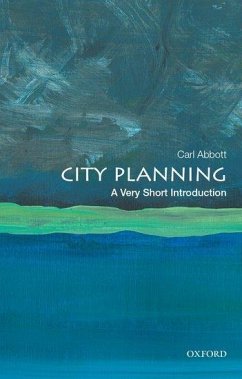City planning is a practice and a profession. It is also a set of goals and--sometimes utopian--aspirations. Formal thought about the shaping of cities as physical spaces and social environments calls on the same range of disciplines and approaches that we use for understanding cities themselves, from art and literature through the social and natural sciences. Surrounding the core profession of city planning, also known as urban or town planning, are related fields of architecture, landscape design, engineering, geography, political science and policy, sociology, and social work. Carl Abbott's addition to Oxford's long-running Very Short Introduction series is a brief but concentrated look at past decisions about the management of urban growth and their effects on the creation of the twenty-first century city.
Hinweis: Dieser Artikel kann nur an eine deutsche Lieferadresse ausgeliefert werden.
Hinweis: Dieser Artikel kann nur an eine deutsche Lieferadresse ausgeliefert werden.








